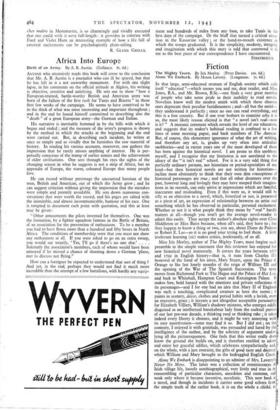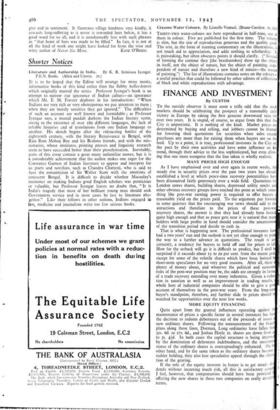Fiction
The Mighty Years. By Iris Morley. (Peter Davies. Jos. 6d.) Alone We Embark. By Moura Laverty. (Longmans. 7s. 6d.)
IN that large, semi-educated stratum of English society which calls itself " educated "—which means you and me, dear reader, and Miss Jones, B.A., and Mr. Brown, B.Sc.—one finds a very great number of people who take some pride in their inability to read novels. Novelists know well the modest smirk with which these choosey ones deprecate their, peculiar fastidiousness ; and—all but the smirk- • they understand it perfectly ; since no one can read everything, and this is a free country. But if one ever bothers to examine why it is so, the most likely reason elicited is that " a novel isn't real—now is it? " A moronic comment which reveals the level of our education, and suggests that its maker's habitual reading is confined to a few lines of some morning paper, and back numbers of The Autocar. But, of course, this elementary ignorance of what the art of writing, and therefore any art, is, grades up very often into articulate snobberies—and in recent years one of the most developed of these has been against the historical novel. I am prone to this snobbery myself, and I recognise that my limitation is not unrelated to the idiocy of the " it isn't real " school. For it is a very, odd thing that perfectly ordinary persons, not historians or period-specialists of any kind—but then historical novels are not written for historians— incline most obstinately to think that their own dim conceptions of historical personages are true; and that all other dreamers over the past, however long and lovingly they may have steeped their imagina- tions in its records, can only arrive at impressions which are fanciful, inaccurate and misleading. Even if this were so, it would still be silly as an objection to a novel, which, historical or not, is presented as a piece of art, an expression of relationship between an artist and something which he has observed in particular, personal excitement. Whether or not it is what people think they mean by " real " hardly matters at all—though you won't get the average novel-reader to admit this easily. They accept the author's absolute rights over Clara Middleton or Miss Bates because, when all's said, they have to ; but they happen to know a thing or two, you see, about Diane de Poitiers or Robert E. Lee—so it is no good your trying to fool them. A little irrelevant learning (sic) makes critics, irrelevantly, of us all.
Miss Iris Morley, author of The Mighty Years, must forgive such preamble to 'the simple statement that this reviewer has enjoyed her new historical novel immensely. It covers the years between 1677 and 5702 in English history—that is, it runs from Charles Ifs bestowal of the hand of his niece, Mary Stuart, upon the Prince of Orange to he last lonely months of the reign of William III and the opening of the War of The Spanish Succession. The story moves from Richmond Park to The Hague and the Palace of Het Loo, and back to Whitehall, Hampton Court and Kensington Palace. It makes free, bold hazard with the emotions and private reflections of its personages—and I for one had no idea that Mary II of England was such a touching, complicated creature as here she seems ; it paints in scenery, decor, clothes and period habits with a lavish, even an excessive, grace ; it invents a not altogether acceptable personality for Elizabeth Villiers, William's shadowy mistress, who emerges oddly disguised as an intellectual knockabout lady from the cocktail parties of our last pre-war decade, a thinking reed or thinking rake ; it takes indeed every liberty it chooses, and it might be very annoying with its easy assertiveness—some may find it so. But I did not ; on the contrary, I enjoyed it with gratitude, was persuaded and lured by the intelligence of the author, and by ihe sobriety of argument under- lying all the picturesqueness. One feels that this writer really does know the ground she builds on, and is therefore entitled to adorn and enjoy her graceful edifice, which celebrates sympathetically and, on the whole, with a just restraint, the gifts of good taste and decency which William and Mary brought to the bedraggled English Court.
Alone We Embark is disappointing to an admirer of Mrs. Laierty's Never No More. The latter was a collection of reminiscences of Irish village life, loosely autobiographical, very lively and true' in its reassembling of particular characters, anecdotes and customs, and weak only where it became inventive, novelistic. This new book is a novel, and though in incidents it carries some good echoes from the simple truth of the earlier book, it is on the whOle a cliché, in
plot and in sentiment. It illustrates village kindness very kindly, it rewards long-suffering as it never is rewarded here below, it has a good word for us all, and it is unashamedly free with such phrases as " that heart of hers was made to be filled." In fact, it is not at all the kind of work one might have looked for from the wise and



























 Previous page
Previous page